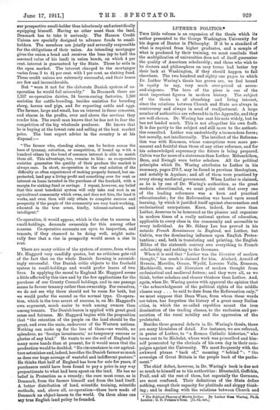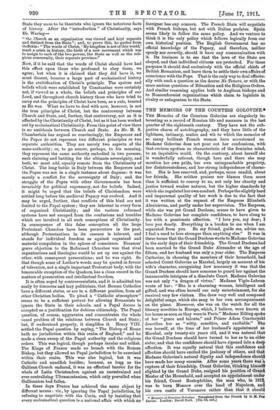LUTHER'S POLITICS..
Tins little volume is an expansion of the thesis which its author presented to the George Washington University for his degree of Doctor in Philosophy. If it be a standard of what is required from higher graduates, and a sample of what is produced by their training, we must conclude that the multiplication of universities does not of itself guarantee the quality of American scholarship ; and those who wish to be doctors and philosophers on easy terms had better try their luck at Washington, if they should happen to fail elsewhere. The two hundred and eighty one pages to which Dr. Luther Waring's thesis has grown are, we feel bound in equity to say, very much over-priced at seven- and-sixpence. The hero of the piece is one of the most important figures in modern history. The subject of the thesis is of absorbing and living interest, since the relations between Church and State are always in controversy and always in need of readjustment. A large number of authorities are referred to in the Appendix, and they are well chosen. Dr. Waring has cast his nets widely, but he has not landed much. This is not altogether his own fault. It is due partly to the subject and still more to the authori- ties consulted. Luther was undoubtedly a tremendous force; but morally, not intellectually. The intellect of the Reforma- tion was with Erasmus, whose conceptions were more per- manent and fruitful than those of any other reformer, and for his acknowledged supremacy the future is being prepared. Calvin was far more of a statesman than Luther. Melanchthon, Beza, and Zwingli were better scholars. All the political principles which Dr. Waring attributes to Luther in his summary, pages 276-7, may be found in previous theologians, and notably in Aquinas ; and all of them were practised by every strong medimval government. When Luther is claimed, as he is by one of Dr. Waring's authorities, as the great modern educationalist, we must point out that every one of the leading reformers was a keen and practical educationalist ; for the Reformation was based upon sound learning, by which it justified itself against obscurantism and ecclesiastical usurpations. Knox, indeed, far more than Luther, deserves to be honoured as the pioneer and organizer in modern times of a really national system of education, applicable to every class in the community and accessible to every individual. As Mr. Sidney Lee has proved in his notable French Renaissance in England, not Luther, but Calvin, was the dominating influence upon English Protes- tantism ; and, both in translating and printing, the English Bibles of the sixteenth century owe everything to French scholarship and nothing to the Germans.
When it is said that " Luther was the liberator of modern thought," too much is claimed for him. Abelard, Arnold of Brescia, Marcilio, Occam, Wyclif, Lorenzo Valla, Erasmus, Machiavelli, were all liberators of modern thought from ecclesiastical and mediaeval fetters; and they were all, as we think, better scholars and clearer thinkers than Luther. And, again, when Dr. Waring quotes with approval the opinion that " the acknowledgment of the political rights of the middle classes may . . . be said to date from the Reformation only," we must suppose that Dean Wase, from whom these words are taken, has forgotten the history of a great many Italian cities, in which the so-called republics meant the iron domination of the trading classes, to the exclusion and per- secution of the rural nobility and the oppression of the proletariat.
Besides these general defects in Dr. Waring's thesis, there are many blemishes of detail. For instance, we are referred, in praise of Luther, to " a Roman Catholic historian," who turns out to be Michelet, whose work was proscribed and him- self persecuted by the clericals of his own day in their cam- paigns against the University. We meet frequently with the awkward phrase " back of," meaning " behind " : " the sovereign of Great Britain is the people back of the parlia- ment."
The chief defect, however, in Dr. Waring's book is due not so much to himself as to his authorities : Bluntschli, Geffckin, Prall, and all the rest of them, but especially the Germans, are most confused. Their definitions of the State define nothing, except their capacity for platitude and sloppy think- ing ; and in dealing with the relations between Church and
0 The Political Theorise of Martin Luther. By Luther Hew Waring, Ph.D.
London : S3. P, Putnam's Bons. etd. net,l State they seem to be theorists who ignore the notorious facts of history. After the " introduction " of Christianity, says Dr. Waring--
" the Church as an organization was viewed and kept separate and distinct from the State" ; and, to prove this, he quotes from Geffckin : " The words of Christ, My kingdom is not of this world,' mark a crisis in history, the birth of a new movement which was to assign to each of the two powers, the State as well as the reli- gious community, their separate province."
Now, if it be said that the words of Christ should have had this effect upon those who professed to obey them, we agree; but when it is claimed that they did have it, we must dissent, because a large part of ecclesiastical history is the stultification of Christ's principle. The system and beliefs which were established by Constantine were certainly not, if viewed as a whole, the beliefs and principles of our Lord, and throughout church history those who have tried to carry out the principles of Christ have been, as a rule, treated as He was. What we have to deal with now, however, is not the true principles of Christ, but the controversy between Church and State, and, further, that controversy, not as it is affected by the Christianity of Christ, but as it has been worked out by ecclesiastical Christianity. From this point of view there is no antithesis between Church and State. As Mr. H. S. Chamberlain has argued so convincingly, the Emperors and the Popes do not represent two different principles or two separate authorities. They are merely two aspects of the same authority; or, to go nearer, perhaps, to his meaning, they represent the same authority embodied in two persons, each claiming and battling for the ultimate sovereignty, and both, we must add, equally remote from the Christianity of Christ. The long battle in Italy between the Emperors and the Popes was not in a single instance about dogmas : it was merely a conflict for the sovereignty of Italy ; and the struggle of the Popes with other Governments has been invariably for political supremacy, not for beliefs. Indeed, it might he urged that the beliefs of Christendom were settled long before the mediaeval Papacy was evolved. And it may be urged, further, that conflicts of this kind are not limited to the Papal system ; they are inherent in every form of organized Christianity; and the various reformed systems have not escaped from the confusions and troubles which are involved in all such conceptions of Christianity. In consequence of this false conception all the large Protestant Churches have been persecutors in the past, although Protestantism in its essence is tolerant, and stands for individual freedom as against organized and material compulsion in the sphere of conscience. Erasmus' grave objection to the Reformed Churches was that rival organizations and theologies would be set up one against the other, with consequent persecutions ; and he was right. So that though some of Luther's words may be quoted in favour of toleration, not a single important Protestant body, with the honourable exception of the Quakers, has a clean record in the matters of persecution and intellectual freedom.
It is often urged by controversialists, and it is admitted too easily by timorous and lazy politicians, that Roman Catholics have a different status, or are in a different position, from all other Christian bodies. To plead a " Catholic atmosphere" seems to be a sufficient pretext for allowing Romanists to ignore the State in their schools, and a Papal decree is accepted as a justification for dubious citizenship. The Papal question, of course, aggravates and concentrates the whole vexed problem of the relations between Church and State ; but, if understood properly, it simplifies it. Henry VIII. settled the Papal question by saying, " The Bishop of Rome bath no jurisdiction within this realm of England," and he made a clean sweep of the Papal authority and the religious orders. This was logical, though perhaps insular and selfish. The Kings of France made no breach with the Roman Bishop, but they allowed no Papal jurisdiction to be exercised within their realm. This was also logical, but it was Catholic and unselfish besides; because, as long as the Gallican Church endured, it was an effectual barrier for the whole of Latin Christendom against an unrestrained and ever-centralizing Ultramontanism, which only prevailed when Gallicanism had fallen.
In these days France has achieved the same object by different means : viz., by ignoring the Papal jurisdiction, by refusing to negotiate with the Curia, and by insisting that every ecclesiastical question is a national affair with which no
foreigner has any concern. The French State will negotiate with French bishops, but not with Italian prelates. Spain seems likely to follow the same policy. And we venture to think it is the only policy which follows logically from our own historical position. The English Government has no official knowledge of the Papacy, and therefore, neither openly nor covertly, should it have any communication with it. Its business is to see that the laws of the State are obeyed, and that individual citizens are protected. For these purposes it should deal exclusively with the official chiefs of British Romanism, and leave them to settle their own affairs of conscience with the Pope. That is the only way to deal effects. ally with such a question as the decree Ne Temere, or with the more serious questions of Education and the Religious Orders. And similar reasoning applies both to Anglican bishops and to Nonconformist organizations which claim to legislate in rivalry or antagonism to the State.











































 Previous page
Previous page